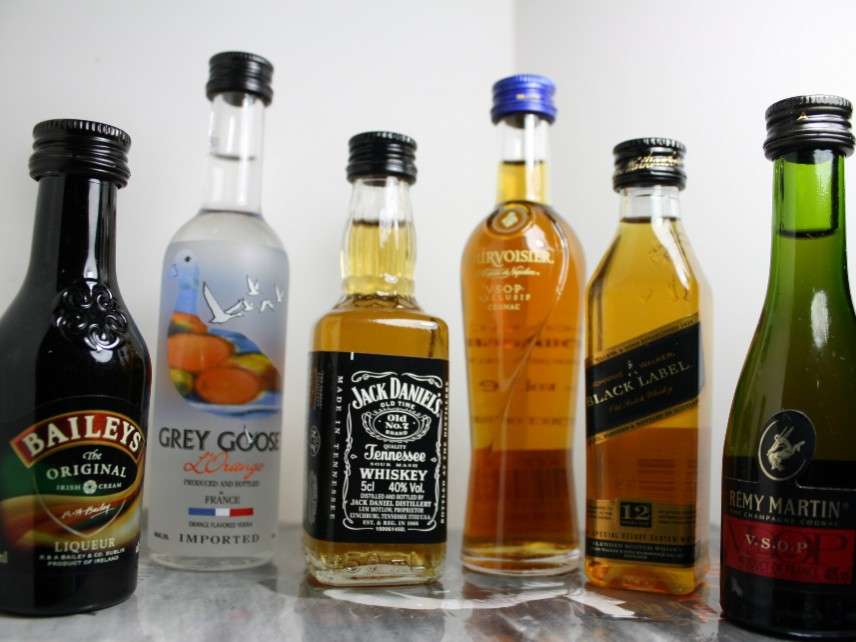Boston Suburb Fights Drunkenness by Requiring People to Buy Bigger Bottles of Booze
South Carolina used to mandate tiny bottles for the same reason.

Thirteen years after South Carolina scrapped its longstanding requirement that bars and restaurants serve distilled spirits exclusively from tiny bottles, a Boston suburb has prohibited merchants from selling the 50-milliliter containers, a.k.a. nips. It says something about the elastic logic of meddling moralists that banning nips, like mandating them, is supposed to serve the cause of temperance.
The nip ban in Chelsea, Massachusetts, which local retailers recently challenged as an illegal modification of their licenses, is aimed at curtailing public drunkenness and littering. "Far too often we have made observations of individuals in an inebriated state in the area of Bellingham and Chelsea Square because of the overconsumption of these particular alcoholic beverages," Chelsea Police Chief Brian Kyes said after the city imposed the ban in May. "They have secreted the containers in their clothing only to be tossed in the street after their use. This local measure should go a long way towards reducing open-air intoxication in our vibrant downtown neighborhoods."
Robert Mellion, executive director of the Massachusetts Package Store Association, told The Boston Globe nips are "not even in the top five" of items found in litter, saying cigarette butts, food wrappers, and water and sports drink bottles are more common. "It's our opinion that Massachusetts has a litter problem, not necessarily a portion-control-sizing problem," he said. "It's a general litter problem in the state that has to be addressed."
As for public drunkenness, nip haters complain that the tiny bottles are inexpensive and easy to conceal. In addition to nixing nips, Chelsea imposed a "voluntary ban" on alcoholic beverages that cost less than $3. What the city views as a liability, of course, strikes most consumers as an advantage. "If you don't have enough money to get a full bottle or an expensive bottle," a local clothing store employee told the Globe, "a nip you drink in moderation. A nip helps you loosen up."
Moderation was the aim of the 1972 constitutional amendment that legalized the sale of distilled spirits by the drink in South Carolina but limited bottles to no more than two ounces. Until then people would bring their own liquor to bars and restaurants, which sold mixers and ice. The idea was that people would get less drunk if they had to buy single-serving mini-bottles. But things did not work out that way, because bartenders would pour all 1.7 ounces into drinks that otherwise might have had one, 1.25, or 1.5, and South Carolina became known for its potent cocktails. By the time the nip mandate was repealed in 2005, the opposition included South Carolina's Baptist Convention and Mothers Against Drunk Driving as well as the state's hospitality industry.
Now Chelsea, employing reverse logic, is anticipating that forcing local drunks to buy larger bottles of liquor will reduce "open-air intoxication." What could possibly go wrong?


Show Comments (46)